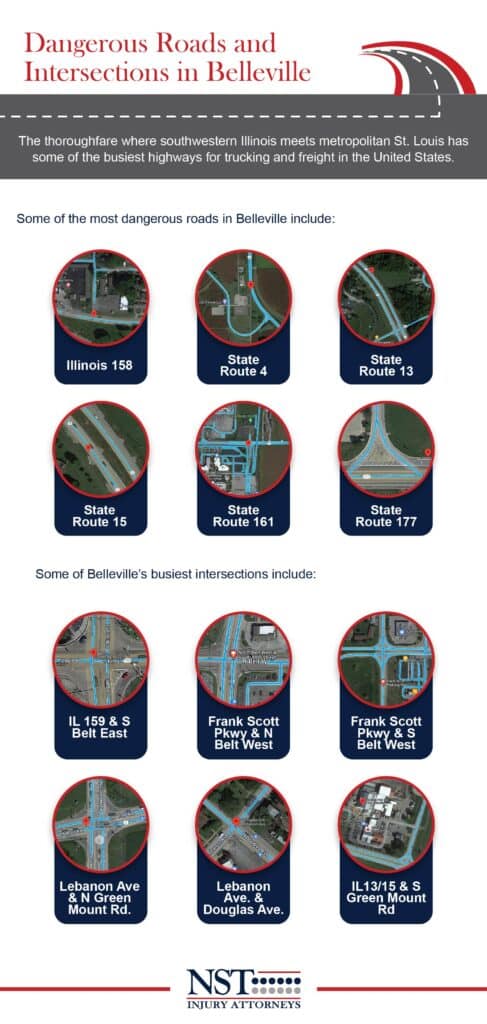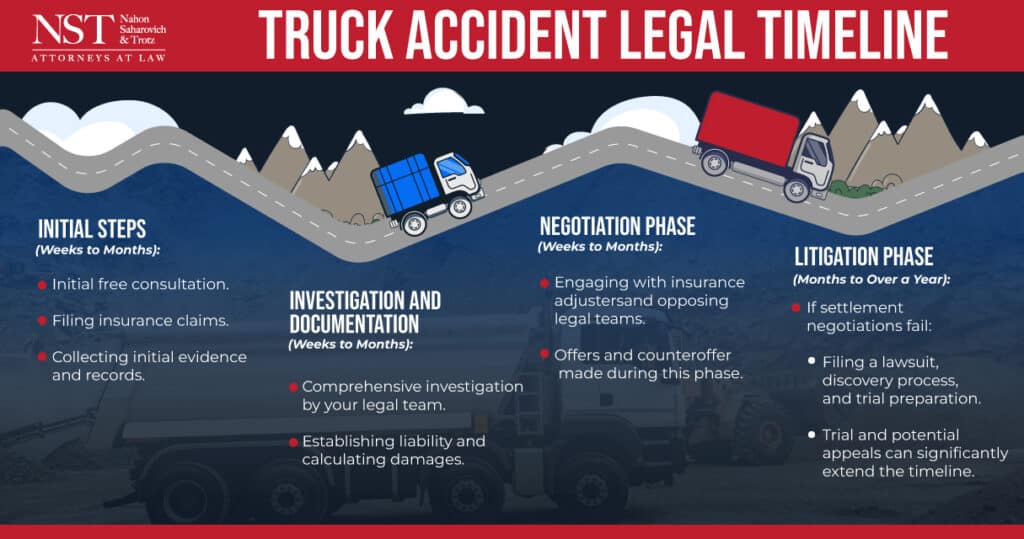
Belleville Truck Accident Lawyers

At NST Law, we are dedicated to helping injured individuals and their families get the justice and compensation they deserve.


Content Reviewed by: Attorney A. Parker Trotz
Expertise
Mr. Trotz has handled injury cases involving auto accidents, slip and fall, premises liability, and negligent security. Every day, Mr. Trotz represents those who have been injured and many of his clients have sustained traumatic and life-altering injuries.
BILLIONS
FOR CLIENTS
YEARS
EXPERIENCE
LAWYERS & STAFF
HELPING YOU
Garbage trucks, oversized trucks, dump trucks, and other commercial vehicles operate routinely on Illinois roads. In total, over 15 million trucks are operating in the U.S. With so many large trucks on the roadways in Belleville and surrounding areas, it’s difficult to avoid encountering one during your commute, making truck accidents a common occurrence. According to the IIHS, commercial vehicle deaths happen in the thousands every year.
Even if you follow all traffic laws and take necessary precautions to prevent accidents, you can’t account for truck drivers’ actions, so there’s still some risk that you could be involved in a truck accident if you frequent busy highways they commonly travel. If you collide with one of these massive vehicles, your risk of bodily injury and property damage is significantly higher than if you were to crash into a smaller car.
Severe, debilitating, long-term, and permanent injuries are possible in a Belleville truck accident, and the financial fallout can be catastrophic. Therefore, you may need an attorney to help you file an accident claim with the relevant insurance companies or a civil lawsuit against the trucking company, the driver, or other liable parties to assist you in recouping some or all of your losses. A personal injury attorney can advocate for fair compensation for you and your family, even if a truck accident results in the death of a loved one.
If you suffered injuries and other damages in a Belleville truck accident, our compassionate and dedicated personal injury lawyers at NST Law can help you with your legal needs. We have experience serving clients in several cities across the U.S, and our team will commit the resources and time you need to ensure you receive the compensation you deserve for your undue harm.
- Truck Accidents in Belleville
- Dangerous Roads and Intersections in Belleville
- Types of Truck Accidents in Belleville
- Causes of Truck Accidents in Belleville
- Illinois Trucking Laws and Regulations
- What to Do After a Truck Accident in Belleville
- Who’s Liable in a Commercial Truck Accident?
- What Damages Can I Recover for a Truck Accident in Belleville?
- How Long Do I Have to File a Truck Accident Case in Illinois?
- How Can the Personal Injury Attorneys at NST Law Help Me After a Truck Accident in Belleville?
- Our Belleville Location
Truck Accidents in Belleville
A commercial truck can weigh up to 30 times the weight of the average passenger vehicle, making them extremely dangerous just due to size and weight alone. Additionally, truck drivers clock long hours on the road, leading to driver fatigue and distractions (e.g., eating or drinking, talking on the phone or radio, etc.). When operating a commercial truck, negligent driving can quickly cause an accident because these large vehicles are much more difficult to stop and maneuver when attempting to correct a mistake.
With about 4,000 accident deaths caused by trucks each year, drivers need to stay alert and cautious to prevent as many incidents as possible. According to the FMCSA, over 40,000 accidents are caused by trucks each year in the United States, and while it’s not always realistic that you can avoid a large 18-wheeler coming in your direction, you have a much better chance of steering out of the way than the truck driver, even when they’re responsible for the impending collision. The most important thing is to ensure your safety and the safety of your passengers.
Unfortunately, once a collision happens, the chances of stepping away from a truck accident unscathed are slim. For example, in September 2021, a devastating crash between a 20-year-old woman driving a 2009 Volkswagen Jetta and a dump truck occurred just east of the I-55/270 interchange in Madison County. Paramedics rushed the young woman to the hospital, where she died from her injuries. Law enforcement closed the westbound lanes of I-70, where the dump truck driver was crossing at the time of the collision to back up and dump his load in a construction zone, for four hours following the deadly truck accident. The truck driver suffered non-life-threatening injuries.
Dangerous Roads and Intersections in Belleville
Commercial trucks often travel many of Illinois’ major highways and roadways, transporting essential goods daily from one part of the state or country to another. The thoroughfare where southwestern Illinois meets metropolitan St. Louis has some of the busiest highways for trucking and freight in the United States. According to IDOT, a massive 2,815,295,626 miles were traveled in 2018 in St. Clair County, with Madison County surpassing 2 billion miles. Therefore, it’s always a good idea to remain vigilant on Belleville and Illinois roads.
Some of the most dangerous roads in Belleville include:
- Illinois 158. Five people have died in crashes on Illinois 158 between Belleville and Columbia in less than four months.
- Trooper Calvin Dye Jr., a spokesman for Illinois State Police in Collinsville, says rural sections of state highways can be “extremely dangerous.” It varies how often accidents happen on certain state highways, but Dye said it’s not uncommon for troopers to respond to Illinois 158 and state routes 4, 13, 15, 161, and 177 for crashes.
Some of Belleville’s busiest intersections include:
- IL 159 & S Belt East
- Frank Scott Pkwy & N Belt West
- Frank Scott Pkwy & S Belt West
- Lebanon Ave & N Green Mount Rd.
- Lebanon Ave. & Douglas Ave.
- IL13/15 & S Green Mount Rd
To stay informed on road closures in and around Belleville and for other announcements to make your commute easier, refer to St. Clair County’s website and follow them on Facebook for updates.

Types of Truck Accidents in Belleville
Any type of truck accident can have devastating consequences for other drivers on the road. The following types of truck accidents are some of the most common:
- Head-on collisions: Head-on collisions occur when two vehicles moving directly toward one another collide.
- Underride accidents: Underride crashes happen when passenger vehicles go partially or entirely underneath the back trailer of a commercial semi-truck.
- Bridge strikes: A bridge strike event is when a vehicle impacts a bridge that carries a roadway over another road or body of water.
- Override crashes: Override accidents typically occur when the truck driver is unable to stop, running over a smaller vehicle in front of them. The truck driver might have failed to yield to traffic with the right of way, or they may be speeding when they cannot brake fast enough.
- Read-end collisions: A rear-end collision occurs when a vehicle crashes into the one in front of it. Common factors contributing to rear-end wrecks include driver inattention or distraction, tailgating, panic stops, and reduced traction due to wet weather or worn pavement. In particular, truck drivers have a more difficult time making fast stops.
- Wide turns: When a trucker makes a wide turn into an opposing lane of traffic, the truck may collide head-on with another vehicle, especially if they lack visibility or have difficulty maneuvering their commercial vehicle properly. Truck driver inexperience can be a contributing factor in these types of accidents.
- Sideswipes: A sideswipe accident involves an impact between the sides of two different vehicles. In this instance, the truck would hit the side of another vehicle, which is likely to cause significant damage on impact.
- Jackknife: Jackknifing describes what happens when the trailer of a large semi-truck or big rig pushes the front towing vehicle to one side or all the way around so that it faces backward, creating a shape that resembles a jackknife.
- Cargo overload and spills: When truck loaders overload a commercial vehicle with more than the recommended volume of cargo, the possibility of rollovers, tire blowouts, and other deadly accidents rises significantly. Additionally, trucks carrying hazardous materials are at risk for spills, making accidents especially dangerous when flammable contents are present. Lastly, if items are improperly loaded, there’s a chance things can fall loose during transport, impacting other vehicles on the road or creating dangerous obstacles on roadways.
Causes of Truck Accidents in Belleville
Most causes of truck accidents are unique to the nature of large trucks and the trucking industry. For example, commercial trucks often carry large or hazardous loads. Additionally, a truck’s blind spots cover vast areas compared to smaller vehicles, making it more difficult for a truck driver to ensure a clear path for changing lanes or making turns. Reduced visibility is especially a concern in certain weather conditions in Illinois, like rain, sleet, or snow. Lastly, increased and more complex maintenance requirements and decreased maneuverability, especially on icy or slick streets, can play a role in accident risk.
Common causes of truck accidents include:
- Driver training and experience
- Blind spots
- Driver fatigue
- Vehicle design and manufacture
- Tire blowouts
- Highway conditions and traffic signals
- Weather conditions
- Disobeying traffic laws (e.g., speeding, driving while under the influence, improper turns, not yielding right of way, etc.)
Illinois Trucking Laws and Regulations
State and federal regulations dictate the rules that truck drivers and trucking companies must follow in Illinois. Unfortunately, truck accidents can happen when drivers and their employers neglect to abide by these regulations or become lax on follow-through.
One specific federal regulation governing truck drivers and the trucking industry is a limit on driving time. This law intends to eliminate driver fatigue, a major cause of truck accidents. Per federal law, drivers can only operate their commercial trucks for a specified amount of time each day and should stop after reaching that limit.
The restrictions mandate that all truck drivers cannot exceed 11 hours driving within 24 hours after spending 10 consecutive hours off-duty. Additionally, they must not exceed 14 consecutive working hours with the same accompanying conditions. Lastly, truck drivers must take a 30-minute break after driving eight consecutive hours without at least a 30-minute interruption. This break can include on- or off-duty hours as long as it’s non-driving time.
The Illinois Department of Transportation (IDOT) maintains 30 rest areas and 11 welcome centers on highways across the state to ensure adequate rest for drivers. The State of Illinois also governs certain weight and dimension restrictions and authorizes requests for permitting for oversize or overweight transports if commercial companies need to exceed those determined limits.
Truck drivers must also record a log of their mileage accurately and places they’ve driven. Thorough and accurate record-keeping is a must for all truck drivers as these logs are subject to review by authorized government inspectors at any time. Truck drivers even have to account for days off to ensure they’re following the hours-of-service regulations. If inspectors find anything to be amiss, authorities can fine the driver or remove them from service. Your personal injury attorney can also use these logs for a civil lawsuit filed after a truck accident. There are minimal exceptions to the daily log requirements.
If a truck driver’s negligence resulted in an accident because they failed to follow state or federal mandates relevant to the trucking industry, our personal injury lawyers at our Belleville office can help you.
What to Do After a Truck Accident in Belleville
After a truck accident, you might suffer serious injuries or shock. You might be scared, in pain, or completely unaware of what to do next. The most important thing to consider after a truck accident is your safety and well-being. Always tend to your immediate situation and any physical injuries first. Next, ensure you follow the proper steps to get the medical or other help you need and protect yourself legally.
After a truck accident, do the following:
- Remain calm and call for help: Contact the Belleville Police Department by dialing 911 for emergencies. If you, your passengers, or the other driver are injured, make sure to request an ambulance. Paramedics can transport you or other injured victims to Memorial Hospital Belleville for emergency care if immediate medical attention is needed. Additionally, Belleville offers an emergency notification and assistance system called CodeRED. This free service provides emergency information to Belleville citizens to warn them of urgent situations happening in the community. The 911 center can quickly send a recorded message to registrants’ phones or email accounts. You can register for notifications on the City of Belleville’s website.
- Provide information for the police report: You must cooperate with law enforcement to help them compile an accurate report of the accident. Never admit guilt or shared responsibility, but do answer any questions they have honestly, and be sure to recall the events of the accident to the best of your ability.
- Gather evidence at the accident scene: If you’re able, take pictures of your injuries, the vehicles, and the location of the truck accident. If any witnesses are present, make sure to get a statement from them and their contact information to follow up.
- Get the truck driver’s information: Ask the truck driver for their name, address, phone number, and insurance information. Also, be sure to request their employer’s name, contact information, and insurance information.
- Report the accident to your insurance provider: Let your insurance company know that you were involved in a truck accident. Never admit fault and don’t accept any settlement offers from any insurance company, including the at-fault driver’s or the trucking company’s provider, without first speaking with a personal injury attorney.
- Contact the personal injury lawyers at NST Law: Our law firm has 10 office locations throughout the United States, including Belleville, Illinois. We have 32 years of experience serving our clients and the communities where we operate. We’ve helped numerous clients receive compensation for their injuries with the sum of our settlements and verdicts totaling $1.5 billion. We commit to civil justice, and we value transparency and compassion when interacting with our clients. We offer free case evaluations to determine the full extent of your claim’s validity and value, and we will always advocate for your best interests.
Who's Liable in a Commercial Truck Accident?
Illinois is a fault state, meaning a person who causes an accident is financially responsible for the resulting damages. When seeking compensation in an accident claim, it’s important to know the party at fault for your injuries to help streamline your claim. With truck accidents, though, things can get a little complicated. In these instances, the driver might not be the only liable party. Trucking companies responsible for training and oversight, cargo loaders, parts manufacturers, brokers, and other parties might share responsibility.
Filing a claim against the wrong person will only extend the length of time you’ll have to wait for compensation to cover your expenses stemming from the truck accident and could cause your claim to be dismissed. A personal injury attorney can evaluate the facts of your case to determine the liable parties.

What Damages Can I Recover for a Truck Accident in Belleville?
Illinois law allows for the recovery of both economic and non-economic damages after a truck accident. Economic damages are actual expenses that are easily calculable. Non-economic damages are a bit more complicated to determine because they don’t correspond to a fixed dollar amount. However, a personal injury lawyer can evaluate your case and determine a fair value for your claim.
Economic damages include:
- Medical expenses (e.g., emergency treatment costs, hospital bills, doctor’s office visits, etc.)
- Pharmaceutical expenses
- Future medical treatment (e.g., surgeries and rehabilitation)
- Lost time from work
- Vehicle repairs
Non-economic damages include:
- Pain and suffering
- Disability
- Disfigurement
- Loss of consortium
Punitive damages are another type of damages a judge or jury can award in egregious cases. These damages intend to punish the wrongdoer rather than compensate the injured party. For example, a court might order a truck driver or trucking company to pay punitive damages if the driver was drunk or under the influence of other substances while on-duty and operating their commercial truck, especially if the truck driver has a history of substance abuse.
How Long Do I Have to File a Truck Accident Case in Illinois?
The statute of limitations governs the time limit for filing personal injury lawsuits in Illinois. Generally, you have two years from the date of the accident to file your civil suit. Once this period expires, courts bar you from seeking compensation with limited exceptions.
Remember, collecting evidence, filing an insurance claim, and negotiating fair compensation can take time. Therefore, it’s important to speak with a personal injury lawyer as soon as possible after your truck accident to ensure you don’t miss strict deadlines imposed by law. Your lawyer can help protect your legal right to sue for damages should settlement discussions not prove successful.
How Can the Personal Injury Attorneys at NST Law Help Me After a Truck Accident in Belleville?

If you’re involved in a truck accident, you might suffer extensive damages affecting you physically, emotionally, and financially. During this already overwhelming time, it’s helpful to have a lawyer handle the complex legal issues that can arise in the aftermath of a truck accident and act as your advocate to get you the compensation you need to assist with your recovery.
Following a truck accident, it’s necessary to ensure the well-being of yourself and your family, disallowing the accident to continue to disrupt your life as much as possible. It’s also important to hold those responsible whose negligent actions caused your injuries and other damages. The Belleville truck accident attorneys at NST Law provide representation throughout Illinois. We truly believe in helping people in need, on and off the job, and we want to ensure the best possible outcome for every injury victim who becomes our client.
If you or your loved one suffered severe injuries or wrongful death in a trucking accident, we want to help you. We can evaluate the merits of your case at no charge, discuss your legal options, and determine accountability. Contact our Belleville office at NST Law today for a free initial consultation.
Our Belleville Location

 Skip to content
Skip to content





